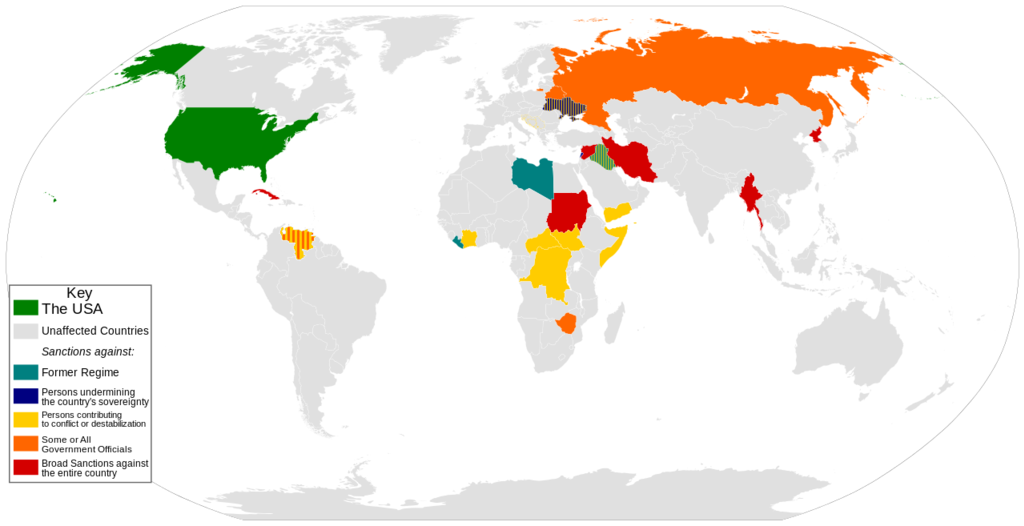The US unilateralism in trade sanctions
24/10/2019Economic sanctions are part of regulatory policies and serve primarily to assist in the restructuring of the economy of a country, and to press other international actors. Can import bans, embargoes, restriction of investments in the US and abroad, confiscation of money under US jurisdiction.
Although economic sanctions are an important tool for the foreign policy of any country, its use should be rare and used only in rare cases. To the extent that we are talking about a unilateral and sudden action, exaggeration in their use involves important international economic insecurities.
The US government is using trade sanctions as one of its main foreign policy instruments. Some sanctions imposed by the US government in years 1980 (especially the embargo of grain and oil pipelines) proved a disaster. Already in the 1990 the US imposed various sanctions over 30 pa RIVER ses.
Several studies show that economic sanctions have a limited capacity change the behavior of the affected governments. To be exact, me every 7, only 1 sanction effectively achieves the desired goal. The other end both penalizing civil society in the affected country, as impacting negatively on own international competitiveness of the United States.

To learn more about limiting the effectiveness of trade sanctions, indico a leitura do working paper “US Economic Sanctions: Their Impact on Trade, Jobs, and Wages” do Peterson Institute for International Economics (https://www.piie.com/publications/working-papers/us-economic-sanctions-their-impact-trade-jobs-and-wages).
Note that the use of economic sanctions is no consensus even within the United States. A U.S. Chamber of Commerce believes that its use is bad for the US economy, in addition to promoting international movements against. To better understand their position, see his manifesto "Oppose Unilateral Economic Sanctions" (https://www.uschamber.com/issue-brief/oppose-unilateral-economic-sanctions).
Despite these studies and placements, what we see is the continued use of trade sanctions by the US government. Usually its use is supported by a proposal for a war against terrorism and the governments that support it. Although the idea is theoretically valid, the reality is that not.
Because it is a one-sided movement and impact especially in civil society, the result is usually the reverse. The negative impact on populations is great as it lowers their general living conditions, generating more revolt in the populations. It is precisely at this moment that anger begins to increase and terrorist movements end up feeding on it..
At the same time that the affected populations suffer, the international economic system also. As these are unilateral measures, affect an entire international economic chain. Economic sanctions cannot be reduced to a pure relationship between two countries. First because, in the case of the USA, its sanctions go beyond the country subject to the sanction, also reaching companies that do business in this country. Second, because the current production system is very interdependent, so that the weakening or country of activity limitation may impact an entire production chain.
To effectively serve as a foreign policy oriented instrument for punishment and consequent behavior modification, trade sanctions should be the result of multilateral decisions, and addressed in multilateral fora.
Each new US trade sanctions on a country, a little of the global economy is affected. This question can not be understood as a problem of American foreign policy only, but as a global issue.
To understand more about the impact on populations, I recommend reading the article “Trade sanctions amount to economic war against civilians, knee relator also ONU“:
Sanctions that extend beyond national borders, and that seek to completely block a country's trade, equivalent to economic war against civilians, stated on Thursday (8) an independent expert appointed by the Human Rights Council.
"These civilians deserve the same protections provided for by the Geneva Convention to people in a war scenario", disse Idriss Jazairy, special rapporteur on the effect of sanctions on human rights.
“There is a need for differences between states to be resolved through peaceful means, as advocated by the UN Charter, avoiding exposing innocent civilians to collective punishment. Causing hunger and disease through economic instruments should not be accepted in the 21st century. ”
Referring to Iran, Jazairy disse que, although United States sanctions exclude humanitarian situations, there are reports that this aid is stalled, since banks, insurers and logistics companies await clarification. It has even been reported that the US will block the mechanism of international financial transfers between banks, which can harm humanitarian aid.
“There can be no justification for not including protections for food imports, medicines and other vital needs without first requiring long and complex approval processes ", said the expert. The International Criminal Court recently issued two preliminary decisions reiterate the obligation of States to ensure effective humanitarian exemptions while sanctions are in place.
"I am deeply concerned about the fact that it is the poor who are bearing the weight of these actions", Disse Jazairy, adding that the Iranian currency, a rial, lost over 70% of its value last year, and that food prices rose by half. "More people are losing their jobs as the economy suffers", said.
“While the right of countries to disagree with each other must be respected, violating the human rights of ordinary civilians should not be used as a means of political pressure on a particular government ”, said. "This is illegal under international human rights law".
When an economic blockade is imposed, foods, medicines, public health and other humanitarian needs need to be guaranteed, said. “The Fourth Geneva Convention provides such protections during times of war”, Disse Jazairy.
"Under economic sanctions, people also die, but for lack of food and medicine, instead of dying from explosive attacks. This form of war that depends on death from hunger and disease deserves the same concern from the international community as any other conflict. ”
States must adopt a declaration that terminates such practices and protects civilians during economic blockades.
“I am ready to work as a facilitator to assist the US and Iran in finding concrete measures to ensure urgently needed humanitarian exemptions, whose observance is not violated by the country of origin, and are effective and viable ”, Disse Jazairy.
https://nacoesunidas.org/sancoes-comerciais-equivalem-a-guerra-economica-contra-civis-diz-relator-da-onu/
Originally published in https://mapamundi.org.br/2019/o-unilateralismo-dos-eua-nas-sancoes-comerciais/


